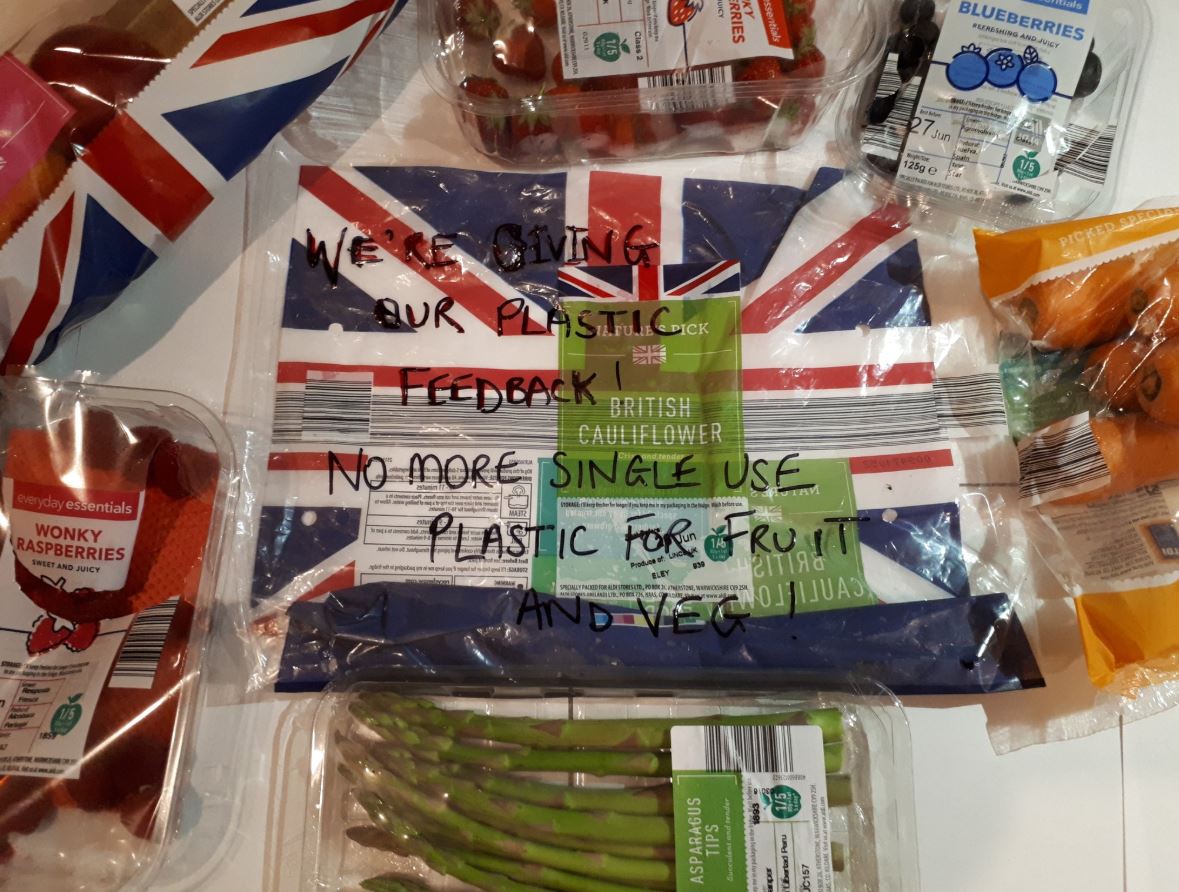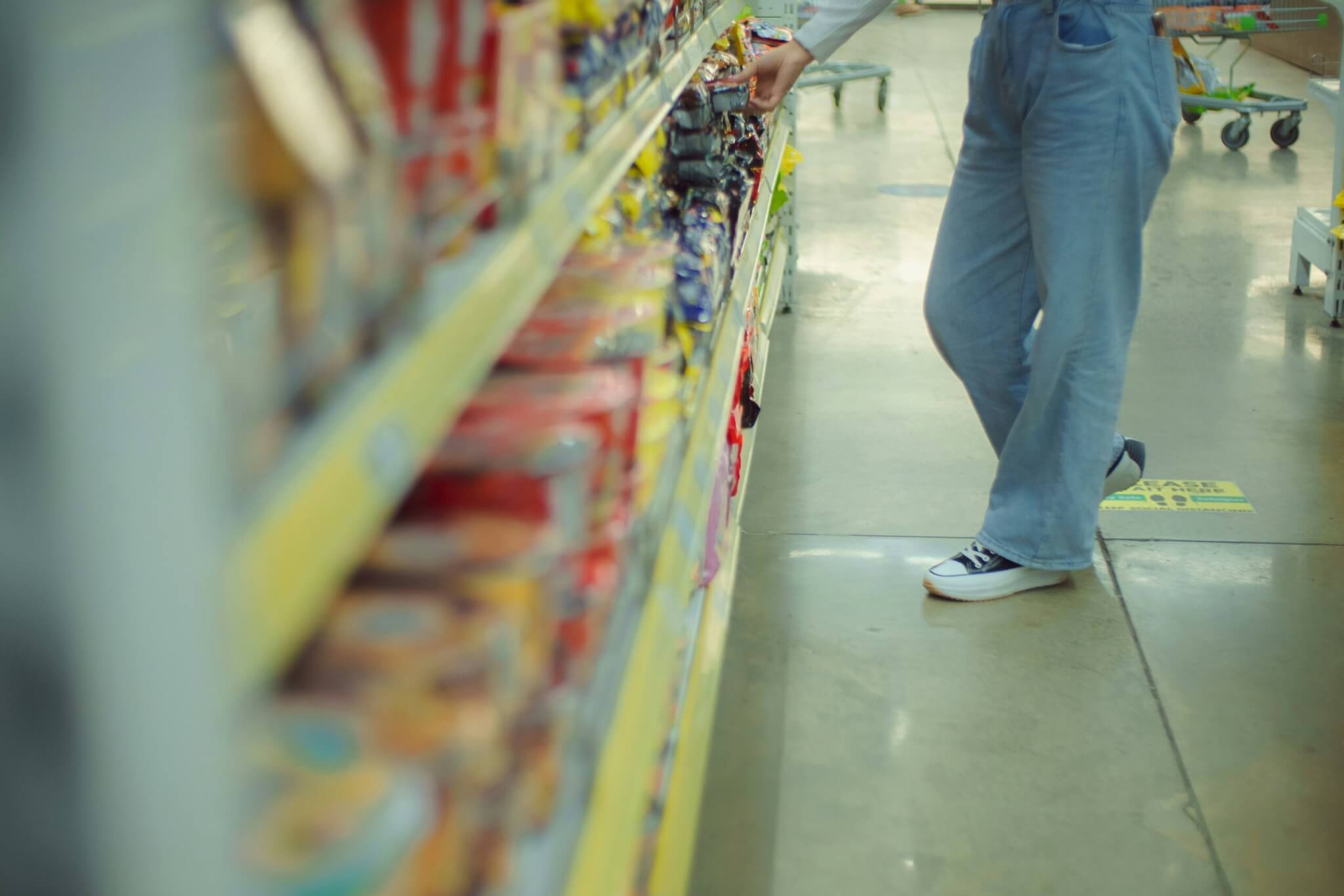People are pleading with supermarkets to reduce plastic by writing on packaging and lids and returning them to their local stores after a call to action by campaigner Hugh Fearnley-Whittingstall.
As part of his new TV programme, Hugh’s War on Plastic, Fearnley-Whittingstall called for members of the public to write their ‘plastic feedback’ on packaging and deliver to supermarkets to highlight their desire to change, and share on social media under the hashtag #OurPlasticFeedback.

The final episode of the three-part series aired on BBC 1 last night (24 June) and covered the issue of plastic toys given away by fast-food chains, as well as the rate of production of new plastic by manufacturers such as Ineon.
It featured two young children arriving at the headquarters of McDonald’s with a petition to remove plastic toys from kids’ meals, only to be turned away abruptly by a security guard. The incident was widely criticised on social media, and the girls’ petition on change.org now has over 185,000 signatures.
The primetime show featured several high-profile cameos and endorsements, including Sir David Attenborough, who said: “Supermarkets, for the sake of the planet, less plastic please.” Other celebrities including singer KT Tunstall and chef Prue Leith also joined the campaign.

Greenpeace oceans campaigner Elena Polisano said: “We need to move away from a throwaway culture, we need to move away from single use towards a new model of reuse and refill.”
It comes in a week when MPs debated banning non-recyclable food packaging following a petition from almost 250,000 people.
The petition statement said: “Today the Earth is at a crisis point due to our plastic consumption, and as a result, people in the UK are more willing than ever to engage in recycling.
“Yet so much food packaging remains completely, frustratingly unrecyclable. Let’s aim for the UK to lead the world with a 100% recycling rate.”
Speaking in parliament, Labour MP Daniel Zeichner, who opened the debate, said: “The plastic bag charge was discussed over many years, and it has now taken 15 billion plastic bags out of circulation. Imagine what proper fiscal incentives and taxes could do to change the way our society considers waste and how committed we all are to recycling.”
MP Neil Parish added: “The government will probably have to be braver on this issue and give stricter advice to local authorities on how they recycle and on having a similar system across the country.”
After listening to the debate and despite the petition, agriculture minister Robert Goodwill, said the government currently has “no plans to ban the use of food packaging that cannot be recycled”.
“Our general approach is to help people and companies make the right choice and develop alternatives, rather than ban items outright. We have already banned the inclusion of plastic microbeads, and…we will be banning the supply of plastic drinking straws, stirrers and plastic-stemmed cotton buds in England from April 2020.”
Goodwill noted that the government has, under its recent Waste and Resources Strategy, outlined plans for the manufacturer of plastic to be responsible for the end destination and environmental impact of their products.
“A key proposal is that producers fund the net cost of managing the packaging that they place on the market once it becomes waste,” he added.













In all the talk about plastic packaging that’s ‘not recyclable’, no-one asks why all of it IS recycled elsewhere. Occasionally, we hear experts mentioning ‘hard to recycle’ and explaining why, but never is the question asked, “Why do some companies say ‘impossible’?”
I think it;’s a matter of economics, where ‘impossible’ and ‘hard’ simply mean “We can’t make a profit from recycling this stuff.” So the answer is simply to make it worth recycling, with a system like the German ‘Grune Punkt’ system
https://en.wikipedia.org/wiki/Green_Dot_(symbol)
Riverford are doing very well in reducing their plastic packaging except in one key area – Dairy.
Milk is still in plastic bottles – personally I have just changed back to glass bottles from the milkman.
Brown Cow yogurt is sold in plastic containers by Riverford but Brown Cow also pack for River Cottage in glass jars.
Would it not be possible for the whole Riverford range of dairy to be packed in returnable reusable glass.
Hi chilting, I have checked for you and the Riverford Dairy started using recyclable plastic bottles for a few reasons. The first one is quality – as the bottles can be properly sealed, this improves the shelf life. More widely recyclable than cartons., all their bottles and pots are fully recyclable, and the bottles are largely made from recycled plastic.
Space is also an issue; The Riverford Dairy is fairly small and the extra space and machinery they would need to offer reusable glass bottles is not possible. Glass isn’t necessarily always more sustainable than plastic; because it weighs more, it has more embodied energy (that’s the energy used to produce, transport, and later recycle it). Transportation would be a real issue for home delivery in terms of extra weight and space on the vans. A washing facility would also require a huge amount of water and energy to run. So for now, all things considered they feel plastic is the best option available.
I’ve been with Riverford for a while and I remember in the past that (in the South) milk came in cartons. I always liked that and was disappointed when we moved ‘up north’ and were supplied with plastic milk bottles from Acorn Dairy. On coming ‘back south’ I was looking forward to cartons again, but I discovered that Riverford has changed.
Hi Philip, Riverford Dairy decided to stop using the cartons as the mixed material construction (plastic lining on cardboard cartons) means the they can’t be recycled.
Morrisons supermarket are providing paper bags instead of plastic ones for loose fruit and veg. Why can’t all supermarkets do this ?
Hopefully this is the start of some major changes to how supermarkets package their produce – and the more demand there, is the more other supermarkets will hopefully follow suit.
I love receiving plastic free veg in my veg box but if I buy extras from the shop it comes in plastic bags that have a 5PP on them. I have written to my Borough to ask whether our kerbside recycling does take polypropylene but I do not really want to buy things from the shop now, thanks. As the film said INEOS are churning out 60-70 billion plastic pellets every day and not only that, the plant is being powered by Fracked Gas from the US. So the UK is well and truly exporting its addiction to fossil fueled plastic to the US as well as dumping it’s plastic on Malaysia. I find it truly disgusting, but, practically, if the UK is to get to net zero by 2025, 2030, 2045, 2050 or whatever, then that is no longer sustainable and I know what I’d rather be using our valuable renewable energy resources on and it isn’t plastic.
I am aware that some of the plastic packaging used for fruit and veg, plus things like bags of rice, is ‘home compostable’. I understand that Asda use this for their fruit and veg where they need packaging. We haven’t got an Asda so I haven’t been able to check. The local health food shop is moving over to this on some of their bagged products.
This sounds like a really good solution to me, avoiding extra transport and problems with getting the recycling done ethically, even where the plastics are recyclable. Is there a problem with this packaging not actually being compostable in practice? If it works then why aren’t all the supermarkets using it? I have just found a packet in the health food shop so in time I will be able to try this out for myself, but it will be a little while away.
Naturally I do appreciate that not everyone has a garden to compost, but this would mean that if people return their packaging to the supermarket the supermarket would be able to do something with it, rather than this just being a protest.
Additionally, when are we going to get the packaging free refill options in the main supermarkets. It needs to be easily accessible as part of the weekly shop or the vast majority of people are simply not going to be able to use it.
Lunch time snacks seems to be one of the big issues to me. I have found that it is easier to get hot food in non-plastic packets. For example Pret a Manger do a range of 3 types of toasted wrap that come in cardboard packets, and do not cost a fortune. Gregs is another, and they now have their plant based sausage roll which is quite tasty. (I can’t see anything non paper based in the wraps packaging but would be pleased to hear if anyone else is aware that this is a actually a problem.)
It all comes back to the simple ‘reduce – reuse – recycle’ with recycling being last on the list. Let’s hope that supermarkets start to offer refills, and packaging free fruit and veg, in response to the demand for change. If there are better facilities for recycling, that are standard across the UK, that would be a good start. Home compostable is part of the solution, but it also needs to be sustainably sourced.